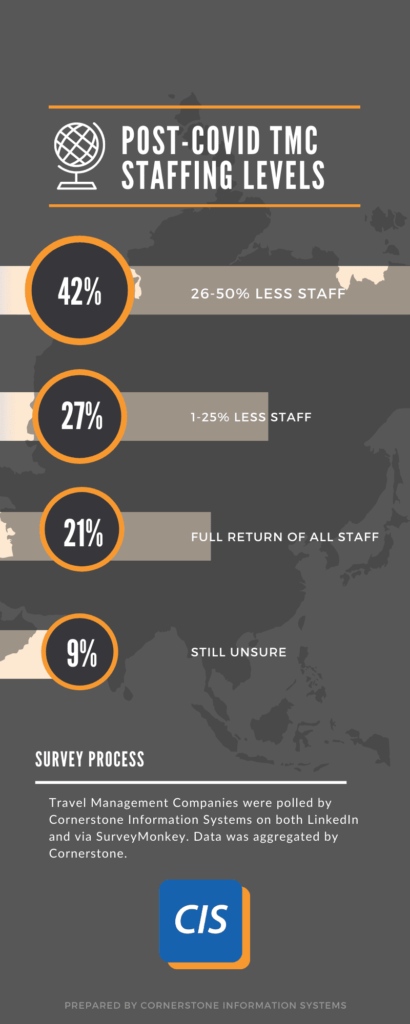“How Will COVID Impact Your Staffing Levels?”
Of all of the industries that COVID has affected, travel is one of those to be the hardest hit. We are recovering slowly, but it could take a while.
Today, the initial contracting of travel itself seems to be in the past. Yes, COVID’s Delta Variant is causing renewed concern, but the overall trend of both leisure and business travel has only been growing. IATA projects travel levels to keep growing – finally surpassing 2019 travel levels in 2023.
But while travel itself may recover, will staffing levels be able to recover as well?
Forbes reported here that more than 62 million jobs were lost in the travel sector in 2020. While we could not find definite numbers on how many of those jobs were held by experienced or long-term travel career veterans, our employees’ professional networks attest that it was a lot.
So not only is the travel industry missing people, it’s missing experience. We wanted to know how TMCs are going to face this challenge as travel itself recovers.
So we did what data geeks do. We conducted a survey to gather our answers.
The Survey Results
The question read: “TMCs: What do you think the impact of COVID will be to your support staffing levels of front-line operation in the next 1-3 years?”
This is what you told us:
[The following is a graphic showing the following statistics:]
- 42% of respondents said that their businesses would operate with a staff reduction of 26-50%
- 27% of respondents said that their businesses would operate with a staff reduction of 1-26%
- 21% of respondents said that their businesses would return to full operating pre-COVID staffing levels
- 9% of respondents said that they were unsure what the staffing levels at their businesses would be going forward as they are still planning on how to respond and recover.

What Does This Mean For The Travel Industry?
Between “working smarter” and “implementing automation”, almost 70% of our survey respondents predicted that their TMCs would not hire back to pre-COVID levels. Another 9% were not sure if they would return to pre-COVID levels or not within the next 1-3 years.
You can already see the potential pain point. If travel itself recovers to 2019 levels by 2023, but businesses are operating with far less staff than they had in 2019, how is all of the work going to be done?
COVID absolutely taught us that Duty of Care is the last thing anyone wants to sacrifice in order to attempt to maximize efficiency in this environment. But can we expect to give each trip the same level of attention as before if we’re down so many people?
Automation For The Future
The only way forward that we can see is to push hard for the automation of as much of the travel industry as possible. It’s time to shed the stigma of automation as the burden that companies take on in order to replace employees. Instead, automation needs to be adopted as the tool which can help our remaining staff more quickly process PNRs, react quicker to disruptions, audit agency travel for policy compliance, and report on trends.
The discussion about automation is no longer about “replacing employees”. The discussion needs to be about helping our employees do more while not sacrificing any attention to our Duty of Care responsibilities.
If you have been on the fence about automating your travel company before, now is a good time to research your options.
We at Cornerstone can help answer any and all of your questions. Let us know how we can help – we have decades of experience in this field and are wholly invested in seeing everyone in the travel industry recover to full strength as quickly and efficiently as possible.

